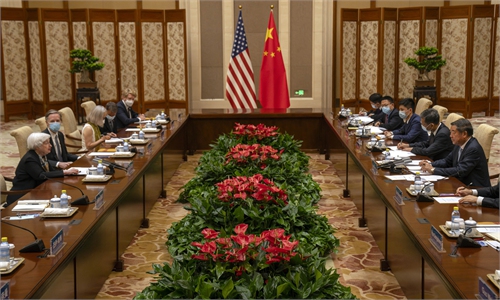
Chinese Premier Li Qiang meets with US Treasury Secretary Janet Yellen in Beijing on July 7. Photo: Xinhua
US Treasury Secretary Janet Yellen wrapped up her China visit on Sunday. During a press conference, she said something the Chinese side often says, "The world is big enough for both of our countries to thrive." She reiterated that the US is not seeking to decouple from China, which would be "disastrous for both countries" and "destabilizing for the world" and "virtually impossible to undertake." She said the US will continue to take "targeted actions" to protect its own national security interests and those of its allies. She noted that the Biden administration does not see US-China relations "through the frame of great power conflict." She said any new curbs or sanctions would "be highly targeted and clearly directed narrowly at a few sectors" that wouldn't have broad-based impacts on the Chinese economy.Yellen is generally regarded as one of the relatively moderate officials toward China in the Biden administration. For example, her words are obviously softer than those by Secretary of State Antony Blinken during his visit to China three weeks ago. We should not simply assume that Yellen is trying to deceive the Chinese people or view her and US hawks' actions as a "good cop, bad cop" routine played against Beijing. It is not ruled out that she may be reflecting a certain aspect or inclination of the Biden administration and American society's comprehensive attitude toward China.
However, despite the fact that both Yellen and President Biden may genuinely not want to pursue the so-called "decoupling" from China advocated by the US hardliners, the current Biden administration's "de-risking" approach specifically targets China's high-tech sector, and the restrictions and sanctions imposed far exceed those of the previous administration. This trend shows no signs of restraint or moderation, but rather escalation. The "chip war" has severely impacted the perception of the US-China relationship in both societies, fueling mutual hostility and further mobilizing the concept of "decoupling." The detrimental effect cannot be offset or balanced by a flimsy explanation such as "the US is not seeking decoupling."
Even though the claim that the US has "no desire to 'decouple'" is viewed with skepticism by the Chinese society and the international community as one of Washington's strategic attitudes, there is still a significant anticipation that there is ample room for further escalation and confrontation between the US and China under the current Washington's policy toward China. The US is preparing an executive order to restrict investment in China, and many believe that its purpose is to further separate China from US high-tech industries and contain China's development. A few days ago, China announced restrictions on the export of key semiconductor materials gallium and germanium, and the global public opinion immediately interpreted this measure as Beijing's retaliation against Washington's disruption of China's semiconductor supply chain.
While it cannot be claimed that statements from Yellen and other senior US officials about "not seeking decoupling" and "not intending to contain China's development" are entirely meaningless, achieving a significant détente in China-US relations is highly unlikely if the US fails to genuinely change its policy of containment and encirclement toward China.
At this juncture, China should focus on two key points. Firstly, it should not outright reject statements like Yellen's remark that "the world is big enough for both of our countries to thrive." Treating all such moderate statements as cunning schemes by the US would be unwise. If China refuses any remarks by the US, regardless of who is making them, to ease tensions in bilateral relations and only responds by exposing the sinister side of the US, it will not help foster resilience in China-US relations. Moreover, it will hinder the establishment of a stable foundation for the relationship at a low level and impede efforts to prevent further deterioration.
Secondly, we must continue to maintain a "bottom line mentality" and prepare for the US side to talk the talk but not walk the walk, and be ready to deal with the US' further suppression on China's science, technology, and economic development. We must try to maintain the huge economic and trade relations between China and the US, never from our side creating additional resistance to the economic and trade relations between the two countries. The overall direction of independent innovation in China's technological development must be firmly maintained, and expanding domestic demand should also be a resolute goal. There is a high possibility that the US policy toward China will be further hijacked by hardliners in the future, so we must constantly strengthen our means and capabilities to counter US suppression.
The author is a commentator with the Global Times. opinion@globaltimes.com.cn


